The Major Requirements for PCI DSS Compliance

PCI Compliance is one of the things any business person who uses or provides merchant services need to be aware of. While most people have just heard of it, it is important that people in the business world know more about PCI DSS Compliance. ivermectina la oameni The first step to doing so is learning about the PCI DSS Compliance requirements. That’s why in this post, we have highlighted the some of the major requirements for PCI DSS Compliance. Let’s check them out together!
-
Contents show
Proper password protections
Point of sale (POS) systems, routers, modems, and other third party products usually come with security measures and generic passwords accessed easily by the public. In more often that not, businesses fail to ensure that these vulnerabilities are secure. Ensuring PCI Compliance in this particular area basically includes keeping a list of the software and all devices that require any security to access such as a password. In addition to password/ device inventory, basic configurations and precautions also need to be enacted, such as changing the password and making it stronger. ivermectin treatment and scabies
-
Use and maintain firewalls
In case you don’t know, firewalls basically block access of unknown or foreign entities attempting to gain access to private data. These are prevention systems that are usually the first line shield against malicious hackers. To be PCI DSS Compliant, the company must use and maintain firewalls. This is because firewalls are very effective when it comes to prevention of unauthorized access.
-
Encrypt Transmitted Data
The data of a cardholder is sent across various ordinary channels (I.e., home office from local stores, payment processor, etc.). This data must be encrypted every time it is sent to all these locations. Besides, account numbers should not be sent to any unknown locations. ivermectin powder human
-
Protect Cardholder Data
A two-fold protection of the cardholder data is another requirement of PCI Compliance. Card data has to be encrypted with some algorithms to protect it. These encryptions are usually put in place with the encryption keys that are also required to be encrypted as well for compliance. Regular scanning and maintenance of PAN or primary account numbers are needed to ensure that no unencrypted data exists.
-
Restrict Data Access
The fifth requirement of PCI DSS Compliance is restriction of data access. Cardholder should be strictly “need to know”. This means that the data should only be accessed by few people who must know it. All executive, staff, and third parties who don’t need access to cardholder data should never have it whatsoever. The roles that do not necessarily need sensitive data must be well-documented and also updated regularly as it is required by PCI DSS.
-
Use and Maintain Anti-Virus
It is a good practice to install anti-virus even though it is not within the PCI Compliance. However, the anti-virus software is a requirement for all devices which interact with and, or store primary account numbers. This software should be updated and patched on a regular basis. Your point of sale provider is also required to employ necessary anti-virus measures in situations where it cannot be installed directly.
-
Unique IDs for Access
People who do not have direct access to the cardholder data need to have individual identification and credentials for access. There should be, for example, a single login only to the encrypted data within several employees knowing the password and the username. Unique identifications create less vulnerability. Besides, unique IDs also create a quicker response time whenever data has been compromised.
-
Properly Update Software
Anti-virus and firewalls will require update often. They should be updated regularly. In additions, it is also a good practice to update any piece of software in your business. Too often, software products will usually include security measures like patches to address vulnerabilities discovered recently in their updates. This adds another level of protection. The updates are usually required for all software on those devices that store or interact with cardholder data.
-
Restrict Physical Access
Restricting physical access to cardholder data is another PCI Compliance requirement. Any cardholder data has to be kept in a physical location that is secure. Both data that is digitally-kept and data that is physically typed or written must be locked in a secure cabinet, drawer, or room. The access should strictly be limited. Furthermore, every time the sensitive data has been accessed, it must be kept safely in a log in order to remain compliant.
-
Document Policies
Any software, inventory equipment, and employees that have access to sensitive data must be documented to remain PCI DSS Compliant. Besides, the logs of accessing the cardholder data must also be documented.



